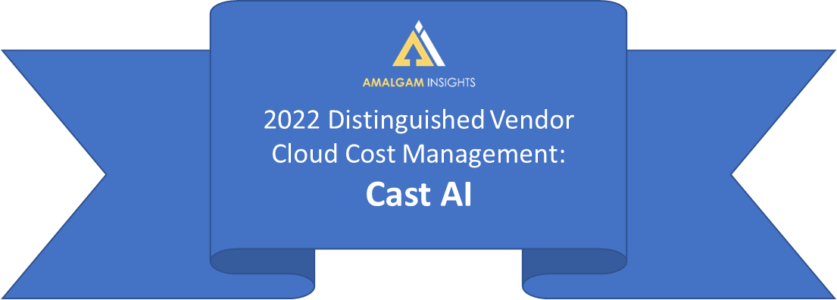
Managing cloud infrastructure is no easy task, especially when containers such as Kubernetes come into play. In our ongoing effort to help organizations understand what they need to do to make the most of their cloud environments, Amalgam Insights this year briefed with a number of management and optimization vendors. We continue to publish our findings, which include analyst guidance complete with a series of vendor profiles. This installment focuses on CAST AI, a company that takes a different approach to cloud cost and optimization management by homing in on containers. Read on to learn why that is so important and to understand Amalgam Insights’ resulting recommendations for enterprises.
WHY CAST AI FOR COST CLOUD COST AND OPTIMIZATION MANAGEMENT
- Optimizes Kubernetes containers on a continuous basis
- Company claims to save users an average of 63% on cloud bills
- Cost reporting and cluster analysis provided as a free service
ABOUT CAST AI
CAST AI is an Amalgam Insights Distinguished Vendor for Cloud Cost and Optimization Management. Founded in 2019, Miami-headquartered CAST AI employs 60 people in Florida and Lithuania. It raised $10 million in Series A funding in fall of 2021, following its $7.7 million seed round in late 2020. CAST AI does not look for a specific customer size; some of its users have fewer than two dozen virtual machines, while others run thousands. The privately held firm does not disclose annual revenue or how much cloud spend it manages.
CAST AI’S OFFERING
CAST AI automates and optimizes Kubernetes environments on Amazon Web Services (AWS) Elastic Kubernetes Service, kOps running on AWS, Microsoft Azure Kubernetes Service, and Google Cloud Platform Google Kubernetes Service as well as Kubernetes clusters running directly on CAST AI.
Cast AI users — who typically are DevOps (Development Operations) experts — may run cost reporting that includes cluster analysis and recommendations. FinOps (Financial Operations) professionals can take the reporting results and incorporate them into their practices.
The CAST AI engine goes beyond cost reporting to rearrange Kubernetes environments for the most effective outcomes. To do this, CAST AI connects to a specified app, then runs a script that installs agents to collect information about the app. After that, a report pops up that can provide recommendations for reducing the number of Kubernetes machines or changing to a different compute platform with less memory, all to cut down on cost.
If a user accepts CAST AI’s recommendations, he or she can click a button to optimize the environment in real time. This button sets off a continuous optimization function to give orders to Amazon Elastic Kubernetes Service (EKS), Google Kubernetes Engine (GKE), or Azure Kubernetes Service (AKS) to rearrange itself, such as autoscaling in real time and rebalancing clusters. Users set their desired automation and alerting thresholds. CAST AI pings the app every 15 seconds and produces an hourly graph. CAST AI claims its users save an average of 63% on their cloud bills.
Pricing for CAST AI varies. CAST AI does not enforce a minimum spend requirement. Rather, it charges by the number of active, optimized CPUs. That starts at $5 per CPU per month and there are tiered discounts from 1-5,000 CPUs, then 5,001-15,000, and so on. Base subscriptions start at $200 per month and go up to $5,000 per month or more, depending on volume discounts. CAST AI provides cost reporting and cluster analysis for free, with no time limits. Users also can buy cost management as a standalone service.
COMPETITION AND COMPETITIVE POSITIONING
CAST AI competes most frequently against the Ocean platform from Spot by NetApp in competitive deals. For the most part, though, CAST AI “competes” against DevOps professionals trying to reduce cloud costs manually — a difficult and time-consuming effort.
CAST AI finds that it gains customers because of its engine’s ease of use and ability to make changes in real-time. This further frees DevOps experts to focus on innovative projects.
CAST AI goes to market via its website and, in Europe, Asia, and the United States, also through third-party partners.
CAST AI’s reference customers including La Fourche, a French online retailer of organic products, and ecommerce consultancy Snow Commerce.
CAST AI’S PLANS FOR THE FUTURE
CAST AI plans to build an air-gapped version of its engine disconnected from the Internet and fully supported within the customer’s internal environment for private cloud users in vertical markets including government and banking. Because CAST AI collects metadata to optimize Kubernetes environments, CAST AI is working on this capability to support more governed industries and organizations.
AMALGAM INSIGHTS’ RECOMMENDATIONS
Amalgam Insights recommends that organizations with Kubernetes containers try CAST AI’s free trial to understand how the platform might help save money and optimize resources. Although Kubernetes has largely won as the software container of choice in DevOps environments, businesses still have not standardized on strategies to optimize the compute and storage associated with containerized workloads and services. Amalgam Insights believes that Kubernetes optimization should not be a long-term direct responsibility for developers and architects as tools emerge to define the resources that are most appropriate for running containerized applications at any given time.
Organizations worldwide are struggling to control cloud costs, especially as they pursue containerization and cloud refactorization projects associated with digital transformation. Organizations also are cleaning up pandemic-spurred cloud deployments that quickly got out of hand and have proven difficult to keep in line since then. CAST AI’s technology provides an option that DevOps engineers should consider as they seek to tighten and optimize the spend tied to applications containerized in the cloud.
Need More Guidance Now?
Check out Amalgam Insights’ new Vendor SmartList report, Control Your Cloud: Selecting Cloud Cost Management in the Face of Recession, available for purchase. If you want to discuss your Cloud Cost Management challenges, please feel free to schedule time with us.
